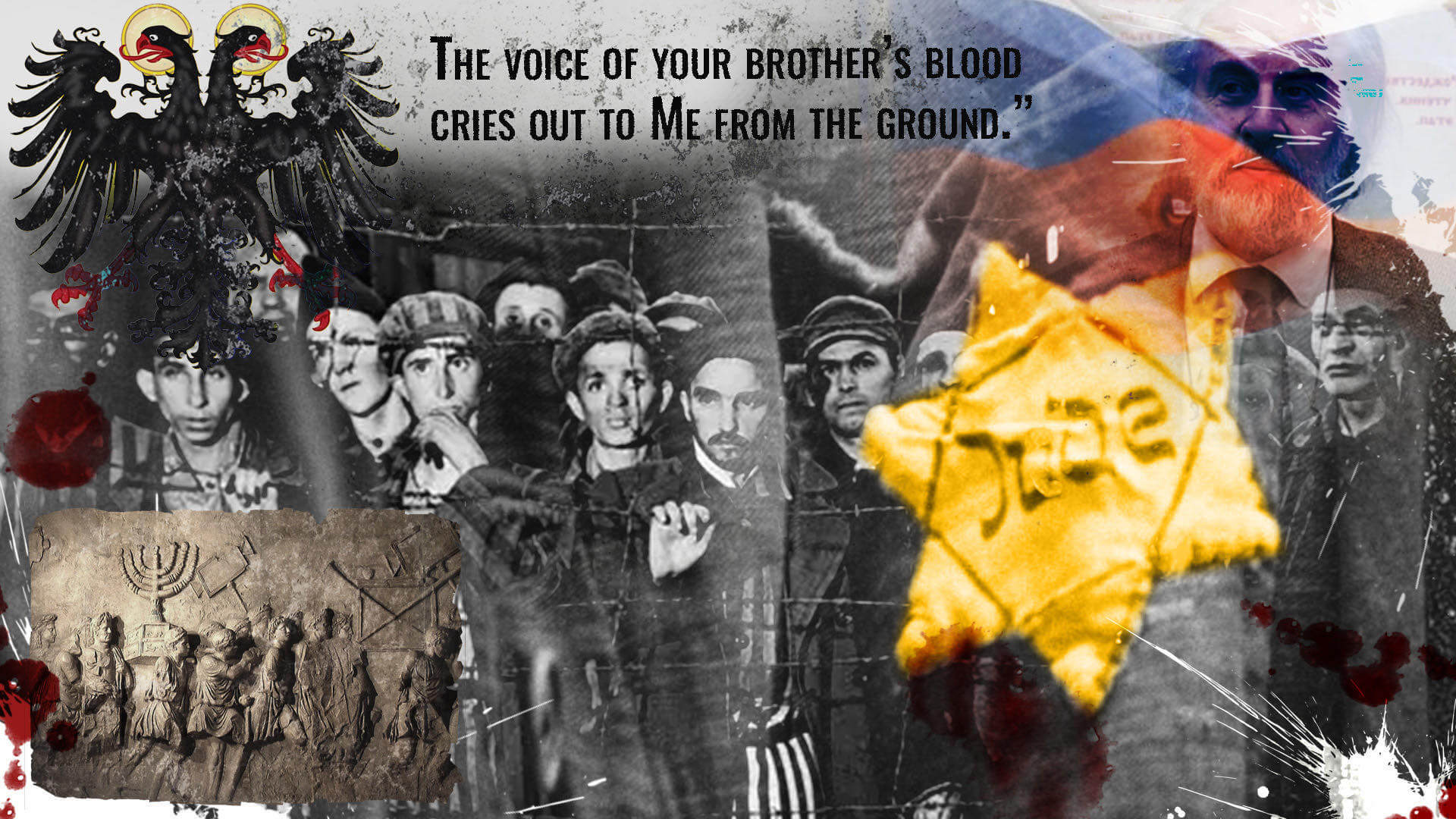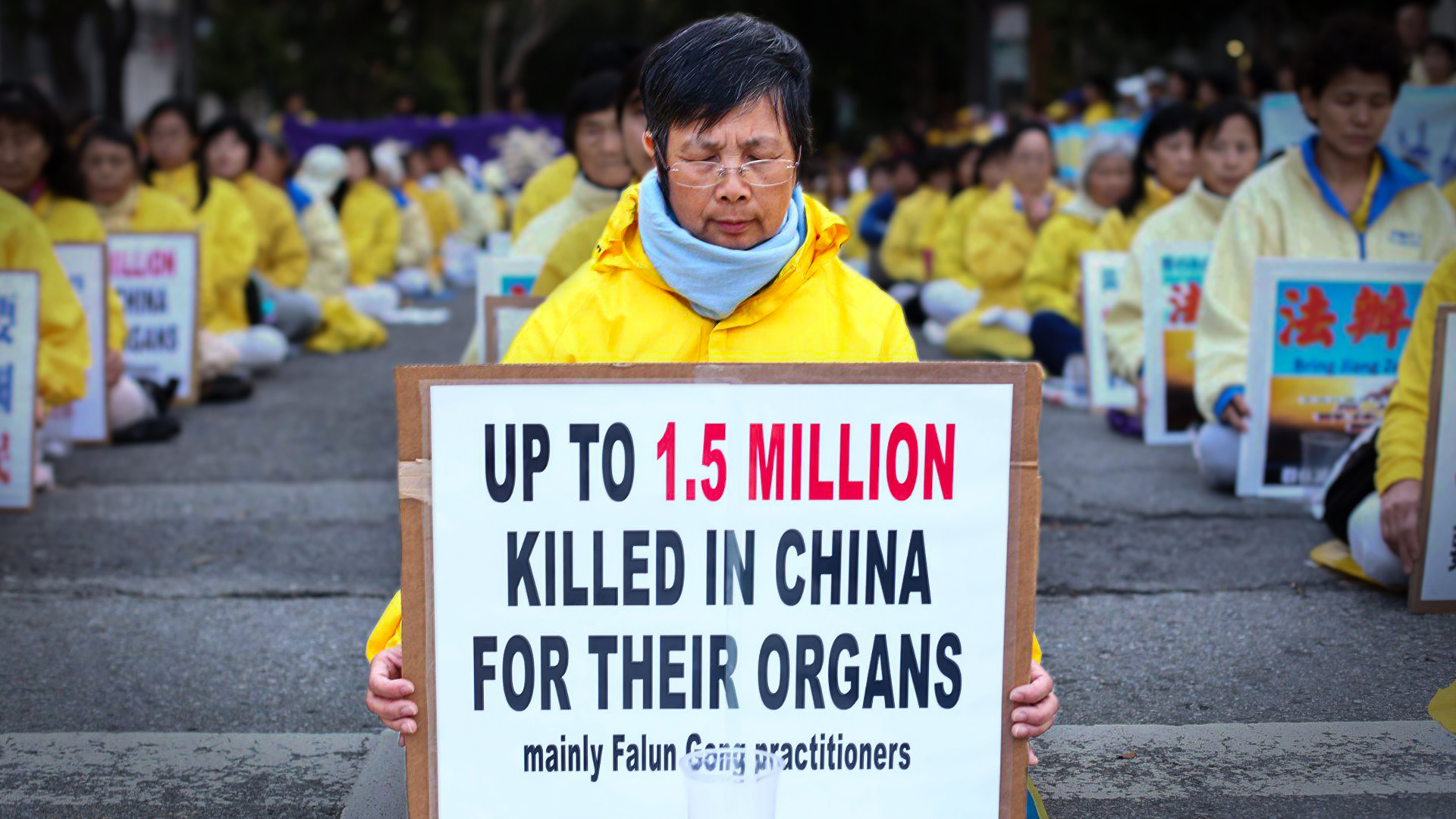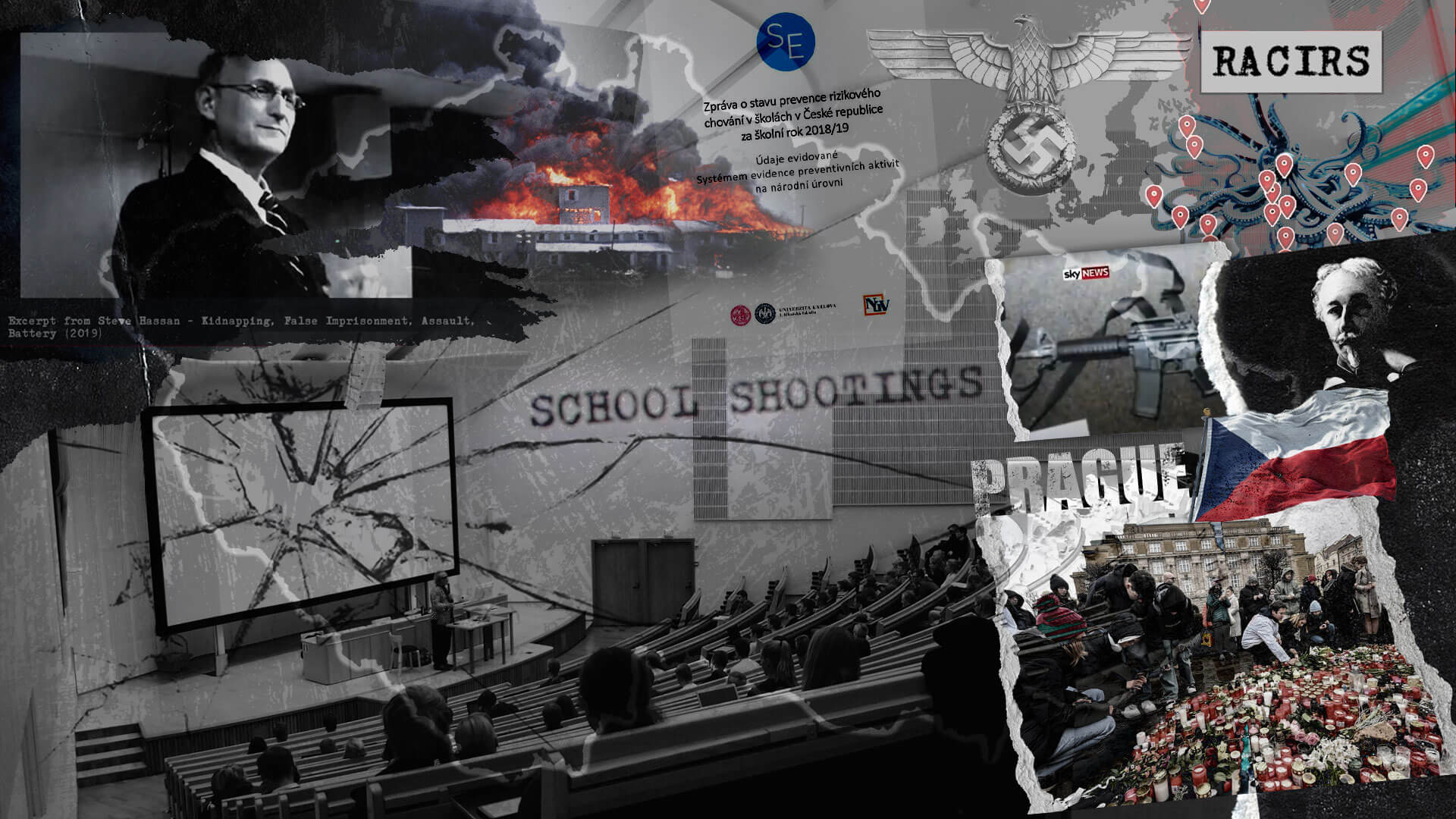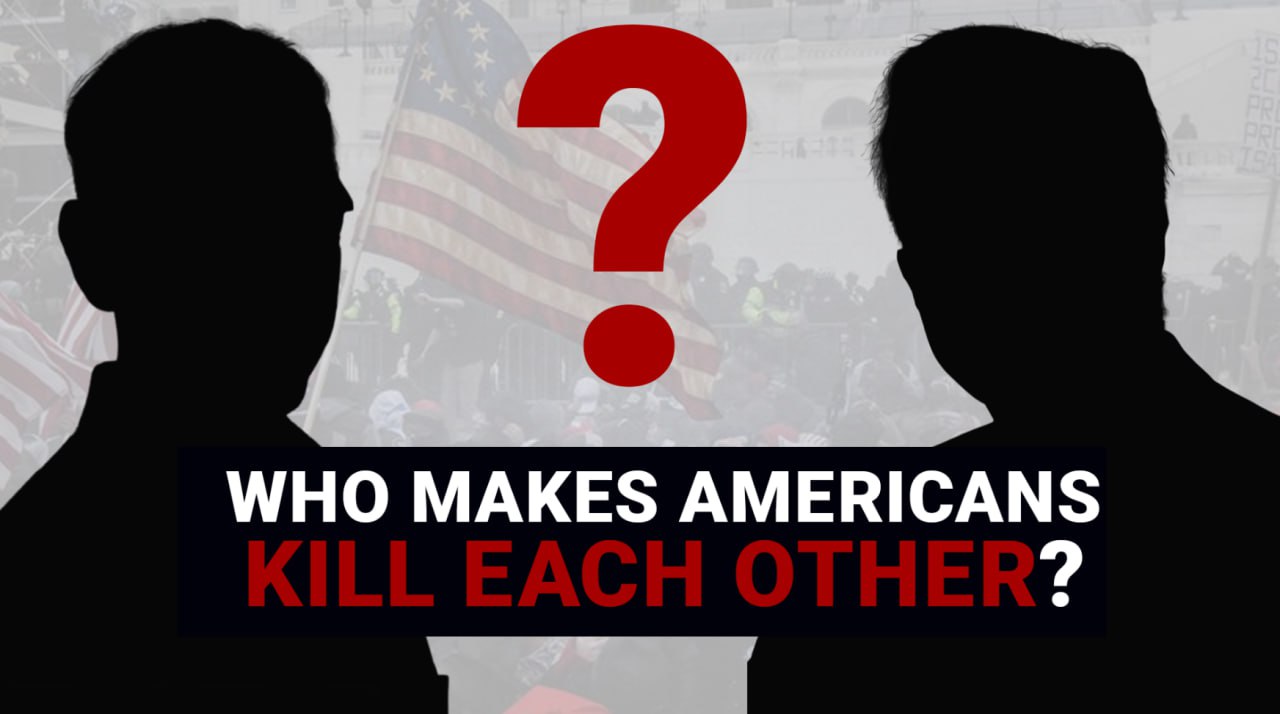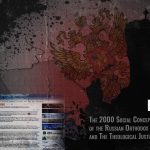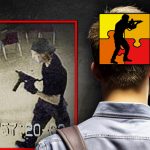Burden of memory
Eighty years have passed since the end of World War II, but the pain of the Jewish people hasn’t subsided. Memories of the victims of the Holocaust, the victims of Nazism, are forever rooted in the minds of subsequent generations. My ancestors also were there — in concentration camps, behind barbed wire, in a hell inhabited by human-like faces. They experienced the entire horror of Nazism at the hands of those who sided with it. The only surviving memory of them is an old photograph from the ghetto, with yellow stars on their clothes — a shameful stigma marking Jews as “subhumans.”
It might seem that carrying such a legacy of one’s people is an unbearable burden for new generations, but the Torah (the sacred scripture of my people) teaches that memory isn’t a burden but a gift from the Almighty, a part of the Divine plan that enables a person to learn, draw lessons, and fulfill the Creator’s will. However, today, this gift has turned into a curse. At a time when all nations swore “never again” — never again to allow the horrors of Nazism — despite that, Nazism is being revived in the world. For those who haven’t forgotten the lessons of history, who have preserved the memory of the victory over Nazism, witnessing its resurgence is particularly unthinkable and unbearable.
Yet, the real tragedy, the full horror and cynicism of the situation is that successors of past Nazis and their ideologists, the current accomplices of modern Nazism, have established and nurtured it in a country that once fought against it, made an enormous contribution to the victory over Nazism, and suffered massive, multimillion human losses. That country is present-day Russia, the successor to the former USSR. It is inconceivable that Nazism could be reborn in the geographical and historical space where it was once defeated, on the “bloodlands” of decisive battles that became turning points in that war. Inconceivable, but it is so.
History is repeating itself: in slogans, in faces, in propaganda, in the dominant religion, in nationalism, in repressions, and in the ideology of superiority of some people over others. All of this is now taking place in Russia, and all of it, just as in Hitler’s Germany, is once again shrouded in the shadow of the apologetic center whose anticult ideologists became the teachers of Nazis and created Nazism in the brutal form as history remembers it.
Shadow that obscured people from the Creator’s plan
What shadow am I talking about? The very shadow that stretches back to 1932 when the apologetic center for combating sects was headed by the German theologian, antisemite, and future Nazi ideologist Walter Künneth. Later on, his apologetic center for combating sects closely collaborated with the Gestapo, supplying the state police and the Ministry of Propaganda with materials and lists of undesirables, and worked with Joseph Goebbels.
The legacy of Künneth has never been interrupted, following a line of succession: Walter Künneth — Friedrich Wilhelm Haack and Johannes Aagaard — Alexander Dvorkin. The height of cynicism is that the current main successor of Nazi ideologues and their best disciple, Alexander Dvorkin, is a Jew.
Nazis with Jewish roots: Is such a thing possible?
It is worth noting that this is far from the first instance of a well-known person with Jewish roots becoming a supporter of Nazism, an ideology of supremacy, or expressing overtly antisemitic views, hating the Jewish people even more than anyone else. Moreover, for an uninformed person who might delve into this topic, it would be surprising to discover the sizable number of such real-life examples. For clarity and understanding, I’ll provide a few of them.
The Viennese Jew and antisemite Otto Weininger . His book “Sex and Character,” filled with antisemitism, and the author himself were repeatedly quoted by Julius Streicher, the Nazi leader and chief editor of the antisemitic newspaper Der Stürmer. Hitler quoted a statement by his mentor Dietrich Eckart about Weininger: “I only knew one decent Jew, and he committed suicide on the day when he realized that the Jew lives upon the decay of peoples…” 1. Goebbels cited passages from Weininger’s writings as evidence of the negative traits of Jews and their hatred of themselves.
Another example: the well-known German philosopher, thinker, and sociologist Karl Marx — the third child in a Jewish family. Marx’s mother came from a family of rabbis. Karl Marx, the grandson of rabbis and a descendant of several generations of Talmudic scholars, was baptized in the Lutheran Church at the age of six. During his studies at the University of Berlin, he befriended theology professor Bruno Bauer. Despite his lineage, Marx’s views were antisemitic.
Let me also give you a modern example: Russian politician Vladimir Zhirinovsky who had Jewish roots, with his father’s grave even located in Israel. That didn’t stop him from making statements for which he was repeatedly accused of antisemitism. Similarly, a number of representatives of Russia’s current political elite have been noted for antisemitism and Nazism, ranging from subtly veiled hints to outright antisemitic remarks, as well as propaganda of war and the superiority of the titular nation and titular religion. These are already elements of a fully formed Nazism at the national level.
Modern antisemitic narratives in Russia have evolved and transformed, but the methods of their dissemination remain the same. Today, under Dvorkin, antisemitism is being introduced into public consciousness in much the same way it was in the past under Künneth. It is intertwined with terms such as “cults,” “sects,” “satanists,” as well as “globalist elites” and “liberal traitors.” All of this is broadcast in discussions and within the propaganda information space and automatically associated with Jewry.
Let me note that the aforementioned list of derogatory labels is nothing more than a tool of anticultists led by the Russian pro-religious organization RACIRS and its leader, Alexander Dvorkin. Remarkably, much of the antisemitic and pro-war propaganda in Russia today is being carried out by individuals who themselves have Jewish roots, at least on one side of their families. Those are educated and well-known people, representatives of Russia’s top political and religious elite, yet they adhere to self-aggrandizement and extreme hatred towards other nations and other religions, including utmost hatred of Jews. Is such a thing possible? This hatred is so strong that Dvorkin has managed to exploit, manipulate and channel it, reviving Nazism based on the knowledge and methods directly passed down to him from Künneth.
Scholars have yet to find an answer explaining such unnatural examples of self-hatred and rejection of one’s own ethnicity by certain individuals with Jewish roots. However, the wisdom of the Torah provides an understanding of the true causes of such destructive processes, which are rooted in the loss of self-identity among those in whom Jewish blood flows.
Loss of identity among Abraham’s descendants: Causes and consequences
What does it mean to be a child of a nation whose existence has been repeatedly threatened with erasure from the face of the earth? What is it like to feel yourself a part not only of those living today, but also of the six million tortured and murdered whose memory is forever etched in one of the most shameful chapters of human history? To the surprise of many people, I will say something frightening: many offsprings of my nation today won’t understand this. Just as they will not understand their purpose ordained for them from above, their role in society, and the global mission of their people.
Talmud Megillah 16a: “This Jewish nation is compared in the Bible to the dust of the earth, and it is also compared to the stars in heaven. This teaches you that when they descend, they descend to the dust, and when they rise, they rise to the stars.” 2
I included this quote to clarify the responsibility of the Jewish people — the responsibility for their choices, for their every action, and for preserving spiritual purity. Departing from one’s people, assimilation of those in whom Jewish blood flows, has a direct negative impact. It is no coincidence that the issue of intermarriage and, more broadly, assimilation is so clearly emphasized in the Torah and the Talmud. This issue often has far-reaching and even global consequences, leaving an indelible mark not only on the lives of those living today, but also on future generations born of mixed marriages.
It is noteworthy that this aspect of the Jewish way of life has often been misinterpreted and negatively perceived by society as unfriendliness, condescension or arrogance. However, this is a mistaken view. In reality, such a way of life is driven by the profound need and necessity for Jews to preserve their identity. According to the Holy Scripture, the people of Israel are destined to bring about rectification of the world, “Tikkun Olam” (תיקון עולם), which cannot be fulfilled through assimilation. Assimilation represents an escape from their purpose, and instead of creation, it leads to destruction. Preservation of the identity of Abraham’s descendants directly influences their spiritual and moral values. Let me delve deeper into the issue of assimilation and its dangers.
Jews have always lived separately, not mixing with others, according to the instructions of the Torah:
Torah, Bamidbar (23:9): “There is a people that dwells apart, Not reckoned among the nations.” 3
The Torah strictly prohibits mixing of the Jewish people with other nations.
Torah, Dvarim (7:3-4) (3): “You shall not intermarry with them: do not give your daughters to their sons or take their daughters for your sons. (4) For they will turn your children away from Me to worship other gods, and יהוה’s anger will blaze forth against you, promptly wiping you out.” 4
Prophets of the people of Israel were staunch opponents of external influences. They feared not only cultural, but also religious and national assimilation. Ezra the Scribe , along with Nehemiah ben Hachaliah , opposed mixed marriages. Their positions were key among the sages of the Talmudic era. This stance was also the main guiding principle of the Talmudic scribes — *soferim * (סוֹפְרִים, literally “scribes”).
(Ketuvim. Ezra 9:1-2) (1): “When this was over, the officers approached me, saying, ‘The people of Israel and the priests and Levites have not separated themselves from the peoples of the land whose abhorrent practices are like those of the Canaanites, the Hittites, the Perizzites, the Jebusites, the Ammonites, the Moabites, the Egyptians, and the Amorites. (2) They have taken their daughters as wives for themselves and for their sons, so that the holy seed has become intermingled with the peoples of the land; and it is the officers and prefects who have taken the lead in this trespass’.” 5
(Ketuvim. Ezra 9:12): “Now then, do not give your daughters in marriage to their sons or let their daughters marry your sons.” 5
The prophet Nehemiah ben Hachaliah assisted the prophet Ezra in guiding the Jews of Judea back to the path of the Torah and explained that they must not intermarry with nations around them:
(Ketuvim. Nehemiah 13:23-28) (23): “Also at that time, I saw that Jews had married Ashdodite, Ammonite, and Moabite women; (24) a good number of their children spoke the language of Ashdod and the language of those various peoples, and did not know how to speak Judean. (25) I censured them, cursed them, flogged them, tore out their hair, and adjured them by God, saying, ‘You shall not give your daughters in marriage to their sons, or take any of their daughters for your sons or yourselves. (26) It was just in such things that King Solomon of Israel sinned! Among the many nations there was not a king like him, and so well loved was he by his God that God made him king of all Israel, yet foreign wives caused even him to sin. (27) How, then, can we acquiesce in your doing this great wrong, breaking faith with our God by marrying foreign women?’ (28) One of the sons of Joiada, son of the high priest Eliashib was a son-in-law of Sanballat the Horonite; I drove him away from me.” 6
One of the greatest religious scholars of all time, Maimonides — Rambam (Rabbi Moshe ben Maimon) — referred to mixed marriages as a flight from Judaism and listed them among the gravest sins. In the passage above, we read that the prophet Nehemiah also mentioned a similar sin committed by King Solomon: “It was just in such things that King Solomon of Israel sinned!” King Solomon loved many foreign women. According to the Torah and Midrashim , those women brought idolatry and spiritual rebellion into his household (Melachim [I Kings] 11:1-10) 7. Although Solomon symbolizes wisdom, traditions state that his descendants sometimes inherited elements of rebellion, “rebellious blood,” which were the consequences of those marriages.
Legends and traditions about “rebellious blood”
Torah, Bereshit (Genesis) (4:10): “Hark, your brother’s blood cries out to Me from the ground!” 8 — this is how God addressed Cain after the latter had killed his brother Abel. Here, blood is presented as a carrier of powerful energy, demanding justice for the act of fratricide. The “crying” blood symbolizes inner conflict and sin. In Jewish tradition, numerous stories address struggle between the spiritual and the material, urging to interpret “blood” as a symbol of passions, inner conflict, or even hereditary rebellion. The purity of blood is given significant importance as a crucial condition for preserving one’s spiritual purpose.
The renowned commentator on the Scripture and the Talmud, Rashi (Rabbi Shlomo Yitzḥaqi ), a descendant of King David, explains a passage from the Torah that describes the Exodus of the Jews from Egypt. Along with the Jews, other nations joined them, whom the Torah refers to as the Erev Rav.
Torah, Shemot (12:37-38): “And the Bnei Yisroel journeyed from Rameses towards Sukkot… And an erev rav (mixed multitude, a mixed company that was large) went along also with them…” 9
Erev Rav is literally translated as “mixed multitude” or “gathering.” In the Scripture, the need for rectification of the souls of Erev Rav is mentioned repeatedly, as those souls represent a mixture of pure forces with forces of impurity. Over time, some of these souls were reincarnated among the Jews in Egypt, while others were reincarnated in the children of Egyptians themselves. Interestingly, according to the Midrashim, it was the Erev Rav who were the source of many problems during the Exodus in the desert. They incited the Jewish people to create the Golden Calf and initiated other rebellions. In Kabbalistic interpretations, the Erev Rav is symbolically associated with “rebellious blood” — a mixture of elements not yet ready to accept the laws of divine order.
In the book of Bamidbar (Numbers) 11:4, it is written: “And the rabble that was among them fell a-lusting; and the Bnei Yisroel also wept again, and said, If only we had basar to eat!?” 10. As a result, the entire nation committed a sin which led to further transgressions.
The negative consequences of the influence of Erev Rav. i.e. of the mixed multitude that included both Jews and Egyptians, proved to be so significant that the renowned Jewish Kabbalist and scholar Ramchal (Rabbi Moshe Chaim Luzzatto), in his work “The Way of God ” (Derech Hashem), Part 2, Chapter 4, considers their inclusion as one of the primary causes of spiritual challenges faced by the Jewish people throughout their history. Erev Rav serves as a vivid example illustrating how dangerous external influences and intermingling can be for Jews, both for the nation itself and for its descendants.
Loss of identity combined with power
As you can see from the examples above, the loss of a Jew’s identity can result in an internal rupture with their spiritual nature and purpose. In this regard, the observed hostility towards Jews among those who also have Jewish roots becomes more understandable, as do the instructions and warnings of the Torah sages. However, the temptation of assimilation isn’t a new phenomenon. As we see in the Torah, it has existed for as long as the Jewish nation itself. So how did our society arrive at the radical phenomena contradicting God’s intent, such as Nazism, antisemitism, and anticultism, which were described at the beginning of this article? What is the cause of such destructive global consequences that have led to the current resurgence of Nazism at the hands of those with Jewish ancestry?
There is an additional factor in this story that corrupts already unstable individuals who have lost their inner foundation, connection with the Creator, and bonds with their nation. This factor is power. As the well-known English historian and politician John Emerich Edward Dalberg-Acton, 1st Baron Acton, said, “Power tends to corrupt, and absolute power corrupts absolutely.”
What can be more dangerous than a mixed seed that has grown in the soil of absolute power wielded by the current accomplices of a new form of Nazism? What can be more sinful than a phenomenon where an internal split occurs, and the potential given by God is directed toward goals entirely opposite to its original purpose? Rebels and insurgents who have lost their roots and descended into Nazism in pursuit of absolute power — what can be worse for the Jewish people and for the world? I’ll repeat the quote cited above:
Talmud Megillah 16a: “This Jewish nation is compared in the Bible to the dust of the earth, and it is also compared to the stars in heaven. This teaches you that when they descend, they descend to the dust, and when they rise, they rise to the stars.” 2
It is no longer surprising that at the top of the current Russian government which aids a new form of revived Nazism, there stand individuals who carry the blood of at least two nations — Russian and Jewish. What is surprising though is how in Russia, outwardly anti-Nazi rhetoric is combined with practical implementation of this ideology. How was it possible for certain representatives of the government to establish a secret order, an occult brotherhood* with elements of pagan beliefs, combined with the titular religion in the country that, until recently, was multi-denominational and multinational? Who holds power in Russia today, and who actually rules the country? Who destroyed democracy and the Constitution? Who is the true ideologist of repression, totalitarianism, and Nazism as a whole?
* Earlier, the actfiles.org portal already exposed the secret order which includes individuals close to the president of the Russian Federation and is connected to the anticult activities of Alexander Dvorkin and hierarchs of the Russian Orthodox Church, in the article “Diveyevo Order: Control Center of Global Anticultism. Revival of Nazism.”
Origins of revived Nazism in Russia
In recent years, the rhetoric and narratives of religious and political authorities, government officials, and opinion leaders in Russia have merged into a unified national agenda so seamlessly that today it’s impossible to distinguish a propagandist from a priest, a journalist from an anticult agent, or a lawyer from a prisoner convicted of terrorism. However, 20 years ago, the situation was entirely different. Back then, Russia was marked by a stark contrast between two opposing paths: the democratic vector and Orthodox imperialism; interethnic and interfaith friendship and anticult persecution and repression; the defense of human rights and freedoms and attempts to usurp political and religious power, distorting the essence and role of religion in society, and so on.
In the context of the anti-democratic vector and gradual permeation of the Russian information space with ideas of Nazism and superiority of the titular nation and titular religion, it is worth mentioning the activities of the Center for Religious Studies in the name of Hieromartyr Irenaeus, Bishop of Lyons, established by Alexander Dvorkin in 1993 under the patronage of the Russian Orthodox Church (ROC). It is noteworthy that this anticult center in Russia, headed by Dvorkin, was created as a replica of the apologetic center of Nazi ideologist Walter Künneth mentioned earlier herein. This is not surprising because one should recall that Alexander Dvorkin is the main successor of Walter Künneth and his Nazi methods of repression and persecution of dissenters. A significant percentage of Dvorkin’s anticult center staff consists of hierarchs of the ROC which over several decades has become the sole national titular religion.
Against the backdrop of their anticult and anti-democratic activities, statements by the Russian leadership, including President Vladimir Putin during 2000-2001, stand out in stark contrast. Let me cite just a few of the statements:
Vladimir Putin, President of the Russian Federation, 2000: “…Our most important task is to learn how to use the tools of the state to ensure freedom: personal freedom, freedom of entrepreneurship, and freedom for the development of civil society institutions. The debate about the balance between power and freedom is as old as the world itself. To this day, it fuels speculation about dictatorship and authoritarianism. But our stance is absolutely clear: only a strong, effective (if someone dislikes the word ‘strong’)… effective and democratic state can protect civil, political, and economic freedoms, and create conditions for the well-being of people and the prosperity of our homeland.
Meanwhile, a strong state is unthinkable without respect for human rights and freedoms. Only a democratic state can ensure a balance of interests between the individual and society, combining private initiative with national objectives. But strong authority is interested in strong opponents. Only under conditions of political competition is a serious dialogue about the development of our country possible. Without truly free media, Russian democracy simply cannot survive, and civil society cannot be built. Therefore, we must guarantee journalists real, not superficial, freedom… Freedom of speech has been and will remain an unshakable value of Russian democracy — this is our principled position.
The democratic structure of our country and the openness of the new Russia to the world do not contradict our identity and patriotism; they do not prevent us from finding our own answers to questions of spirituality and morality, and there is no need to specifically search for a national idea. We cannot achieve sustainable development without a truly independent judiciary and an effective law enforcement system. We must learn from our experience and recognize that the key role of the state in the economy is, without any doubt, the protection of economic freedom…” 11.
Vladimir Putin, President of the Russian Federation, 2001: “As for possible concerns of some of our citizens or those who sympathize with our country and live abroad regarding the path the state will take, I can say the following: as long as I remain the head of state, we will adhere strictly to democratic principles of development. We will develop the political structure of society; we will develop civil society, and we will strive to keep government institutions under public oversight. We will do this persistently and consistently, and I am confident that there is no alternative to democratic development and a market economy for the state.
There will be no other path: there will be no dismantling of democratic structures and institutions, or departure from the rule of law. This will not happen. Not only would it be counterproductive, but it also doesn’t align with the entire philosophy of what we are striving to achieve in the country. …Russia has been a democratic country and will do everything to remain on this path and develop precisely in this direction.” 12
What is remarkable is that the current rhetoric of Russian president Putin not only completely contradicts his original democratic values, but also fully aligns with the Russian successors of Nazi ideologists — modern anticultists led by Alexander Dvorkin. Unlike the Russian president, however, the rhetoric of anticult players has never changed, remaining consistent throughout more than 30 years of their activity, since the moment Alexander Dvorkin arrived in Russia and launched his anticult campaign to suppress dissenters.
An example of the anticultists’ unchanging rhetoric is the international anticult conference “Totalitarian Sects: A Threat of the 21st Century,” held in Nizhny Novgorod, Russia, in 2001. I’ll cite excerpts from the speech of one of Alexander Dvorkin’s accomplices, Russian Orthodox Church archpriest Dmitry Smirnov 13. His imperialist rhetoric, rooted in an ideology of superiority, stands out sharply against the still-dominant democratic state policy of that time, which upheld fundamental human rights, freedom of religion, and freedom of speech.
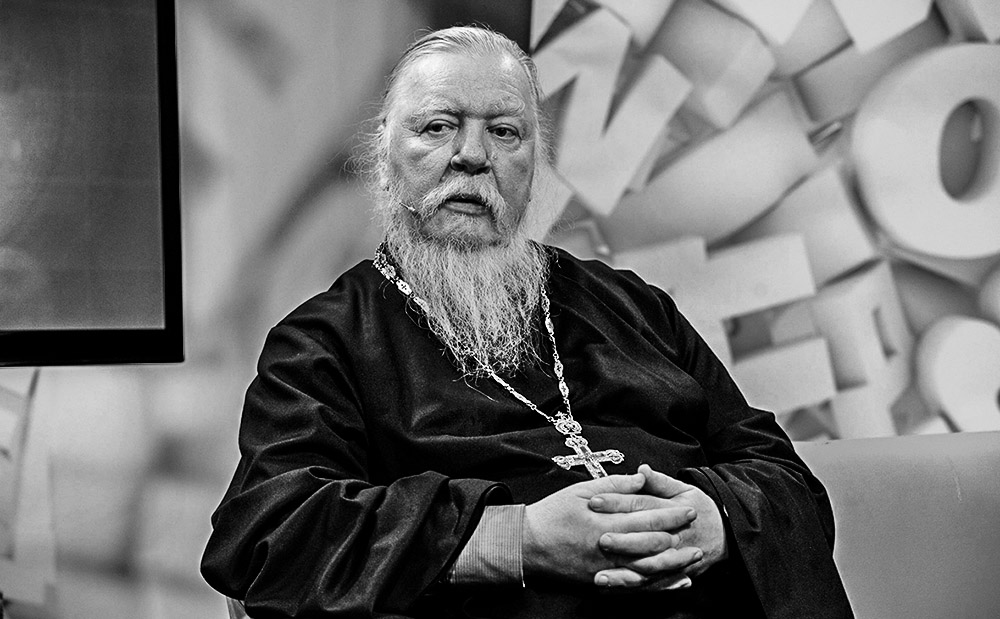


Let me specifically highlight a few of his remarks: “The thing is this. We, thank God, were born and raised in an empire, and, of course, every Russian person has a normal imperial consciousness.”
“…We are used to the fact that Russia is big, Russia is powerful, Russia is great; that we have plenty of nuclear buttons, and we can destroy the world altogether — yes, in principle, that’s possible. But now we no longer have people with the courage to press those buttons. The people have shrinked spiritually. There are no longer people who would dare to do it, dare to say, yes, we can dictate, we can call the tune.” Here, it’s important to note that among those who have access to the nuclear briefcase is the country’s president. Can we thus conclude that this anticult accomplice and follower of Alexander Dvorkin, by stating that there are no longer people with the “courage to press the nuclear button” and that “the people have shrinked spiritually,” was hinting at the lawfully elected president of the Russian Federation and the democratic course of development he had chosen at that time (as of 2001)?
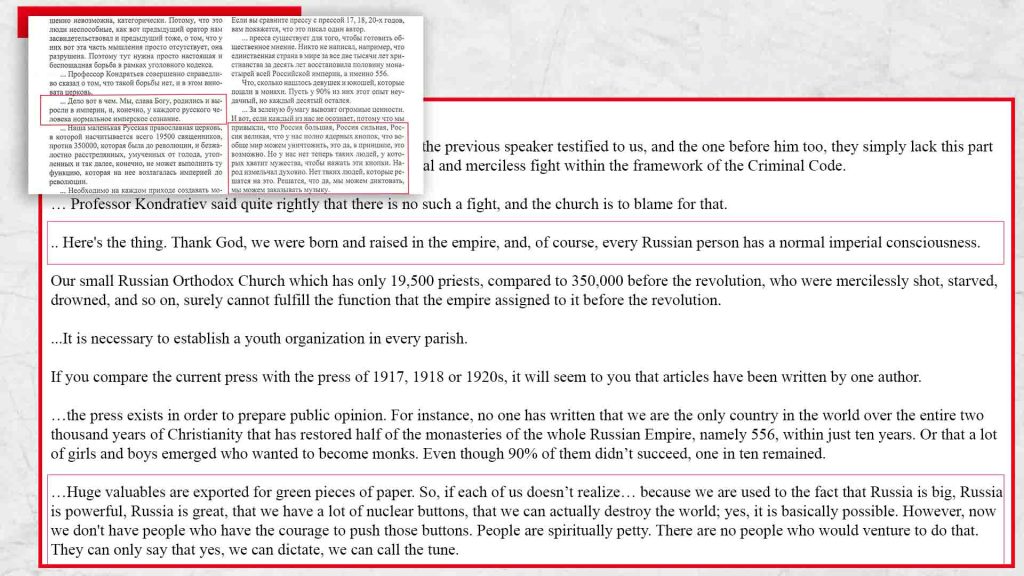
It should be noted that over time, the rhetoric of Russian president Vladimir Putin, as well as that of many in his close circle, began to change noticeably, becoming increasingly similar to the rhetoric of ideologically biased representatives of the church, particularly those involved in the fight against sects, and to the rhetoric of leaders of the anticult movement.
How did Dvorkin’s term “totalitarian sect” originate?
Today, Alexander Dvorkin is considered the author of the term “totalitarian sect” which he introduced in 1993. With this term, Dvorkin and his accomplices stigmatize all dissenters, regardless of the activities, goals, or objectives of the targeted organizations. However, it is fair to say that there is actually one organization in the world that fully matches the characteristics of a “totalitarian sect” as described by Dvorkin: namely, the Center for Religious Studies in the name of Irenaeus of Lyons, which he himself founded. This very anticult center later became the main ideological and coordinating hub of the Russian pro-religious association RACIRS that is also headed by Alexander Dvorkin. The structure of Dvorkin’s anticult center explains how he was able to describe the characteristics of a “totalitarian sect” in his book “Sectology” with such accuracy: after all, it is easy to describe an organization that you yourself created.
Below are the sociological and psychological features included in the characteristics of a “totalitarian sect” according to Dvorkin, as reflected in the activities of his Center for Religious Studies in the name of Irenaeus of Lyons.
A “totalitarian sect” implies:
– The presence of a charismatic authoritarian leader (Alexander Dvorkin himself);
– Intolerance of criticism, lack of internal discussion and pluralism, confirmed by statements from some former members of his anticult center;
– A rigid totalitarian-type organization;
– Certain traits that grant members of the organization a sense of exclusivity as evident in the monopoly held by Dvorkin and his anticultists on expert opinions in the media, as well as in religious and public circles;
– An ideology that proclaims the organization’s goals as virtuous and justifies the methods used to achieve these “goals”: Dvorkin and his followers declare their mission to save the “lost sheep” in so-called “sects” or “cults” and return them to the fold of the true Church;
– Devoted service to the leader: no one questions any of Dvorkin’s words or actions;
– A pyramidal structure with levels of secrecy surrounding the leader, which also extend to the work of some of Dvorkin’s agents within the FSB;
– Uniformity within the organization, similar methods of manipulation and influence, and identical guidance materials: in the Center for Religious Studies in the name of Irenaeus of Lyons, activities are conducted in full accordance with the methods and knowledge earlier used by the Nazi ideologist Walter Künneth and are carried out using similar manuals;
– Application of specific methods to recruit, manipulate, and ideologically indoctrinate new members;
– The role of “little gurus” played by those close to the leader: as the Center for Religious Studies in the name of Irenaeus of Lyons grew, numerous assistants and “close associates” of Dvorkin emerged, and the network of anticult units expanded across countries. The leaders of those units began to act as “little gurus” for the rank-and-file members of such branches of the “totalitarian sect”;
– Possible dissemination of apocalyptic narratives as has been repeatedly observed in Dvorkin’s statements regarding the coming of the antichrist and salvation from him within the fold of the true Church, etc.
Thus, there is an actually existing totalitarian sect that adheres to Nazism, with its own leader and a direct successor of the knowledge and methods of Nazi ideologist Walter Künneth. As a result, for many years, Dvorkin’s followers — Nazi sectarians — have been terrorizing the Russian people. In light of such anti-democratic activities, questions arise for the guarantor of the Russian people’s security — President Vladimir Putin: how does he feel in his own country under such conditions, as the son of a man who fought against the Nazis? Is he the same kind of traitor to Russia as Dvorkin’s followers? Or has he, after so many years, failed to see the obvious? Or, perhaps, he too has been brainwashed by Nazi successors armed with Künneth’s methods and is merely repeating their words?
Yet, simply stating that Alexander Dvorkin established a Nazi totalitarian sect would be insufficient. The portal actfiles.org previously revealed facts about the connections between anticult agents and Russian intelligence services. Moreover, according to testimonies from some ROC hierarchs, including those persecuted by Dvorkin himself, as well as from former employees of RACIRS, the network of anticultists created by Dvorkin operates as a genuine internal intelligence service, performing reconnaissance and subversive functions. This is further confirmed by the methods used to infiltrate their agents into various organizations.
Let’s go back to the anticult conference in Nizhny Novgorod in 2001 and the speech delivered by archpriest Dmitry Smirnov 13.
“…creation of such organizations… from where these guys can be sent, like scouts, into sects to gather addresses, names, photographs, so that they can create their own structures within and blow up those sects from the inside.” — Dmitry Smirnov.
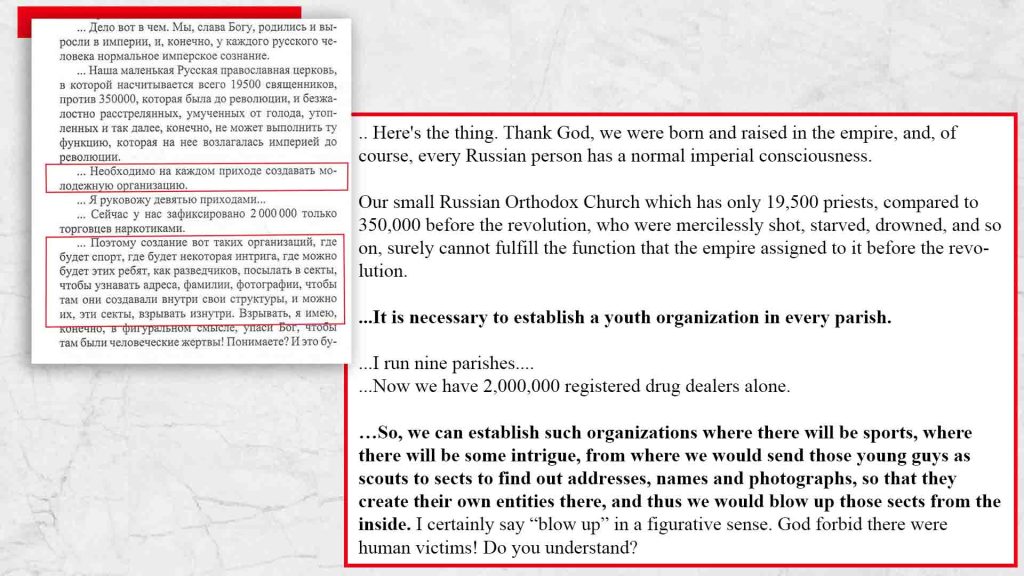
Today, Russians regard themselves as the titular nation and consider Orthodox Christianity the titular religion. This stance is reinforced by anti-migrant policies and the increasingly frequent antisemitic and anti-Islamic narratives voiced by Russian politicians. Hidden Nazism is thriving in Russia, skillfully disguised as patriotism. At the same time, the machinery of repression and the process of stigmatizing dissenters are intensifying: the lists of “undesirable organizations,” “sectarians,” and “foreign agents” continue to grow. We are witnessing the height of cynicism: the people whose ancestors once fought against Nazism and defeated it are now being turned into Nazis themselves through Nazi tools. This tramples on the memory of the victims of Nazism and the Holocaust. Moreover, this topic is clearly exploited and manipulated within the context of the country’s adopted military ideology.
Meanwhile, the successors of Künneth’s apologetic center, currently led by Alexander Dvorkin, remain in the shadows. Unlike Walter Künneth who staked on Hitler and ultimately paid the price for that, Alexander Dvorkin apparently chose not to stake on Putin. Instead, over decades, he secretly infiltrated his agents into various government entities, seizing key positions of influence over society in all spheres — from mass media and religion to politics and education of new generations. Anticult agents deliver lectures to security services and other law enforcement, and repeatedly visit universities and high schools, addressing students and their teachers.
Initially, Alexander Dvorkin usurped religious influence through his followers, including those among the ROC hierarchs. Subsequently, he expanded his influence to legislative and executive branches of government, law enforcement agencies, and even intelligence services, effectively seizing real, rather than nominal, power in the country. As a result, today in Russia, foundations of the constitutional order have been undermined, and the human and citizen rights and freedoms have been trampled, including freedom of assembly, freedom of speech, freedom of religion, freedom of movement, and private property rights. Democratic institutions have been dismantled, the rule of law has been abandoned, and people have been deprived of legitimately elected leadership. Civil society is under pressure through systematic repressions and suppression of dissent.
Secret intelligence service consisting of Nazi sectarians and having its agents in various countries
Today, the ideologists of Nazism have established an international network of their agents. Many of Dvorkin’s followers — representatives of the anticult network in various countries — fully echo their Russian leader. Anticultists, wherever they are located, precisely replicate the narratives beneficial to RACIRS, similarly infiltrate government bodies, mass media, and law enforcement, and use the same Nazi methods of Künneth to dehumanize dissenters and ruin democracy in their own countries. Some of them hypocritically claim independence, yet in practice they continue to pursue their leader’s goals, carrying out all the commands coming from RACIRS, like well-trained German shepherds, entirely and utterly loyal to their guru, Dvorkin. This is clearly a well-organized intelligence service operating in the shadows, with agents acting with impunity in many countries across the world.
It is worth recalling a striking fact from the history of the Auschwitz III (Monowitz) concentration camp. On October 16, 1942, the national leadership in Berlin issued an order to construct a kennel in Auschwitz for 250 service dogs. The funding amounted to 81,000 German marks. Every measure was taken to ensure good sanitary conditions, and a large area with lawns was allocated, along with a veterinary hospital and even a special kitchen. This way, Nazis took care of the dogs trained to guard thousands of death camp prisoners who lived in inhumane conditions. Unlike the dogs, the prisoners endured horrific sanitary and hygienic conditions and were regarded by the Nazis as livestock, as a flock of sheep watched over by Nazi dogs.
Nowadays, Nazism has mutated: guard dogs are no longer needed, nor is there a necessity for concentration camps in such numbers. For Dvorkin’s executioners, prisons and psychiatric hospitals often suffice. Totalitarianism is gradually expanding and turning the world into a unified camp of repression, where the role of Nazi guard dogs is now performed by certain people who have lost their honor, conscience, and human dignity, choosing instead the place where they feel safest and most comfortable. Today, we witness firsthand the calamities unfolding across the globe, in large measure because mankind is drifting away from its connection with the Almighty and resisting His divine plan and commandments.
Political and ideological concept of Russia: “Moscow, the third Rome”
When examining the new form of Nazism in present-day Russia, one cannot but mention the political, historiosophical, and theological concept of “Moscow, the third Rome” which asserts that Russia is a successor to the Roman Empire. This concept combines nationalism, Christianity, and the idea of a unified eternal empire, aligning perfectly with the state ideology adopted by Russia in recent years and the position of its dominant titular religion.
The acceptance of this idea automatically shifts the political and religious center of the Christian world to Russia. It is worth noting that under the symbolism of the messianic idea of “Moscow, the third Rome,” there has been a sharp nationalization of the church. This symbolism has become the foundation of Russian empire-building, infused with elements of mysticism and a salvational mission imposed on Russia to act as the “restrainer” holding the world back from satanism and universal evil.
Apart from the officially promoted ideology, it’s important to highlight another aspect of Russia’s claimed succession from the Roman Empire — the one that will not be mentioned by Orthodox imperialists, anticult Nazis, or Russian political figures. Coincidence or not, by positioning itself as a successor to the Roman Empire, Russia automatically inherits the idea of hereditary rebellion and rebellious blood, as Rome is the direct successor and spiritual heir of Edom . Once again, we return to the Talmudic sages.
The world is full of “kingdoms of Edom,” with its center in Rome
Edom, also known as Esau, was the son of the patriarch Isaac and his wife Rebecca, and the elder twin brother of Jacob. Esau is known for his immoral behavior and is the embodiment of willfulness, physical strength, and passions, in contrast to Jacob who adhered to the moral principles of his father and grandfather, Abraham. Esau-Edom and his descendants were the complete opposite of Jacob and his descendants, the Israelites. The Jewish people descended from Jacob, while the Edomites descended from Esau. The Edomites were also referred to as Idumeans because they originally settled in a region called Idumea and presumably located to the south and southeast of the Land of Israel. There was eternal enmity between the Jews and the Edomites since they were always complete opposites of one another. During the siege of Jerusalem by Titus, 20,000 Edomites slaughtered the Temple guards and looted the city. After the fall of Jerusalem, “Edom” came to symbolize Rome as the mortal enemy of Judaism. Subsequently, the Roman Empire was regarded as a nation at war with the Jewish people and God’s plan. According to the Midrashim, Rome-Edom was one of the four kingdoms that, according to tradition, ruled over the Jewish people, alongside Babylon and Greece.
Incidentally, Russia employs another concept, presented in the 15th-century folklore “Tale of the City of Babylon.” The concept outlines an ascension of historical development and succession of power along the line: Babylon — Constantinople — Moscow. Russia, as a successor of Babylonia in terms of historical development, takes on a different perspective when considering the legend of the Tower of Babel, which is also a symbol of rebellion against God. According to some sources, the initiator of the Tower of Babel construction was Nimrod, a descendant of Ham , the son of Noah. It is worth recalling that Ham and his lineage were cursed, and in Jewish tradition, Ham became a symbol of disrespect, moral decline, and rebellion.
Yet, let’s return to the succession of Rome. One of the greatest commentators on the Scripture and scholars of the Torah language, Radak (Rabbi David Joseph Kimchi), pointed to the ethnic connection between the Romans and the Edomites. However, when Rome is referred to as the successor of Edom, it is primarily its symbolic and spiritual essence that is emphasized. Rome as a symbol of that Rome which conquered Judea sought to destroy Jewish traditions and built the pagan capital Aelia Capitolina on the site of sacred Jerusalem. If Moscow currently positions itself as the successor to such a Rome, this too explains a great deal. By the way, the ideas of fascism also originated in Rome, and one of the founders of Italian fascism, Benito Mussolini, chose the fasces, or fasci — the emblem of the authority of Roman emperors — as the symbol of his political movement.
CONCLUSION
Present-day Nazism doesn’t shout “Heil Hitler,” but simply methodically exterminates those it deems undesirable. The essence of Nazism as a phenomenon lies in destruction, repression, and perpetual confrontation. It can only exist through wars and the presence of enemies. But what happens when external enemies run out? Victor Klemperer, a German writer, philologist, and researcher of totalitarian thought and the language of Nazi Germany, answered this question in his book “LTI — Lingua Tertii Imperii: a philologist’s notebook ” in 1947:
“Had the Führer really achieved his aim of exterminating all the Jews, he would have had to invent new ones. ” (Chapter 26: The Jewish War)
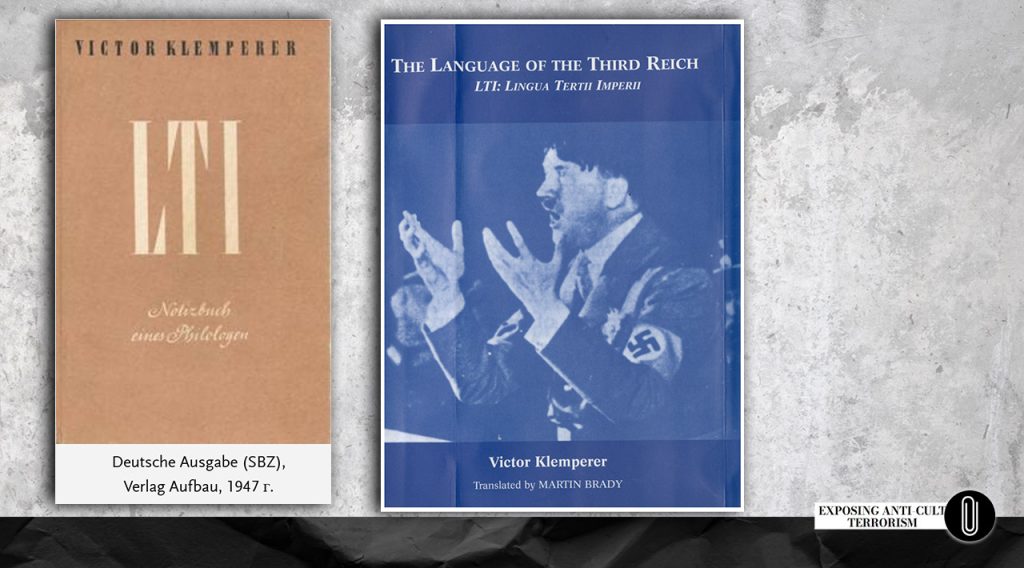
So is it worth following a path that leads only to death? Hatred, chaos, suffering, Nazism — all of this has taken place before, and all of it is repeating again. Unfortunately, those who have forgotten their purpose become a source of human grief and destruction, while those who do not remember their history are doomed to relive it.
Sources:
1. https://www.jpost.com/Opinion/Columnists/Another-Tack-The-Otto-Weininger-syndrome
2. https://www.sefaria.org/Megillah.16a.16?lang=bi&with=Commentary&lang2=en
3. https://www.sefaria.org/Numbers.23.9?lang=bi&with=all&lang2=en
4. https://www.sefaria.org/Deuteronomy.7.4?lang=bi&with=all&lang2=en
5. https://www.sefaria.org/Ezra.9.2?lang=bi&with=all&lang2=en
6. https://www.sefaria.org/Nehemiah.13.25?lang=bi&with=all&lang2=en
7. https://www.sefaria.org/I_Kings.11.2?lang=bi&with=all&lang2=en
8. https://www.sefaria.org/Genesis.4.11?lang=bi&with=all&lang2=en
9. https://www.biblegateway.com/passage/?search=Shemot%2012&version=OJB;KJV;ESV
10. https://www.biblegateway.com/passage/?search=Bamidbar%2011&version=OJB;KJV;ESV
11. https://youtu.be/qR7s0dlVcv0?t=7
12. https://www.youtube.com/watch?v=K-7x9DBrZf0
13. http://www.npar.ru/wp-content/uploads/2016/02/%E2%84%963_2001.pdf

